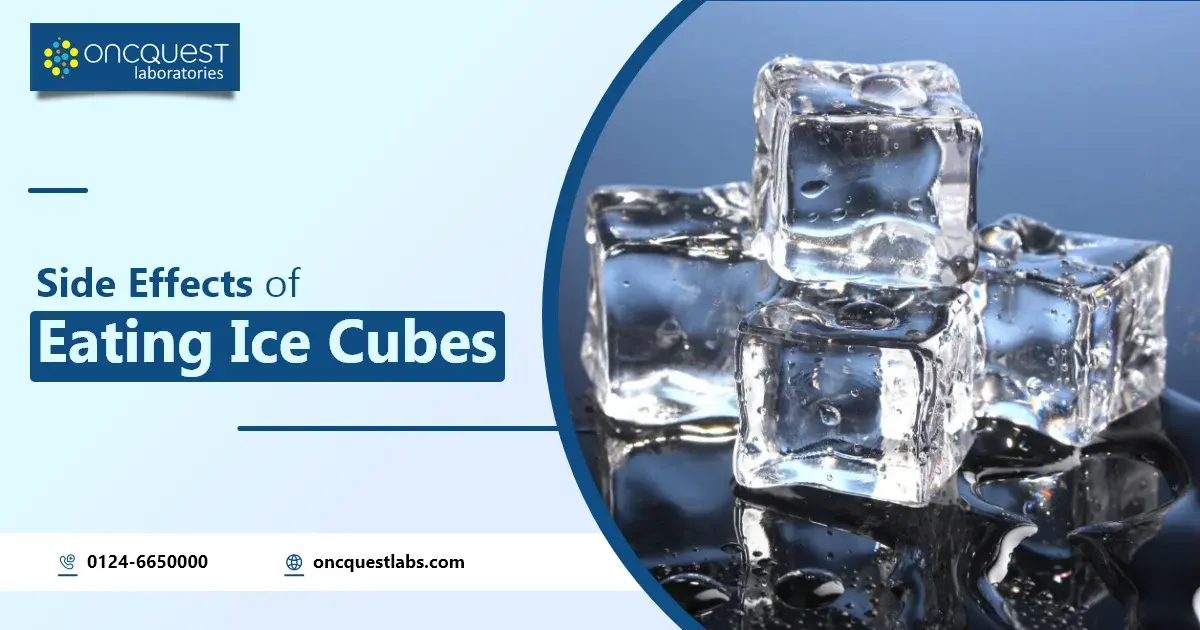Eating ice cubes is a common habit that many people enjoy for various reasons, from cooling down on a hot day to soothing mouth pain. While it might seem like a harmless and refreshing activity, it’s important to understand both the benefits and potential side effects associated with this practice. Ice cubes can offer immediate relief and certain health advantages, but excessive consumption may also lead to some health concerns. This article aims to provide a comprehensive overview of the benefits and side effects of eating ice cubes, helping you make informed decisions about incorporating this habit into your daily routine. By understanding both the positive and negative aspects, you can enjoy the refreshing qualities of ice cubes while minimizing any potential risks.
Contents
Ice Cubes Nutrition Facts
Ice cubes, primarily composed of frozen water, have virtually no nutritional value in terms of calories, fats, carbohydrates, proteins, vitamins, or minerals. Each 100 grams of ice cubes contains 0 calories, 0 grams of fat, 0 grams of carbohydrates, and 0 grams of protein. They also lack significant amounts of vitamins and minerals, such as vitamins A, C, calcium, and iron. Despite the absence of nutritional content, ice cubes are critical in hydration. Consuming ice cubes can help maintain adequate fluid levels in the body, especially in hot climates or during physical activity. While they do not provide any direct nutritional benefits, their role in helping to stay hydrated is essential for overall health and well-being.
Side Effects of Eating Ice Cubes
Dental Health Issues
Eating ice cubes can pose significant risks to dental health. The hardness of ice can cause enamel erosion, leading to weakened teeth that are more susceptible to decay. It can also result in cracks or chips in the teeth, which might require costly dental repairs. In severe cases, chewing ice can lead to fractures that necessitate root canals or tooth extractions.
Iron Deficiency (Pagophagia)
A condition known as pagophagia, characterized by the compulsive eating of ice, is often associated with iron deficiency anemia. Individuals with this condition crave ice as a way to relieve symptoms of iron deficiency, such as inflammation of the tongue. However, relying on ice to alleviate these symptoms can delay proper diagnosis and treatment, potentially exacerbating health issues related to low iron levels.
Digestive Problems
Consuming large quantities of ice can cause digestive discomfort. The extreme cold can lead to stomach spasms and pain, as the digestive system struggles to process the unusually cold temperatures. This can result in bloating, gas, and general digestive unease.
Throat and Esophagus Irritation
Regularly eating ice cubes can irritate the throat and esophagus. The continuous exposure to cold temperatures can lead to inflammation and soreness in these areas. In some cases, it may even cause damage to the delicate tissues lining the throat and esophagus, leading to chronic discomfort.
Risk of Choking
Eating ice cubes carries a risk of choking, especially if large pieces are consumed or if the ice is not chewed thoroughly. Choking on ice can block the airway, creating a potentially life-threatening situation that requires immediate medical intervention. It’s important to be cautious and mindful while eating ice to minimize this risk.
Potential for Poor Nutritional Choices
For some individuals, the habit of eating ice may replace the consumption of more nutritious snacks. This can lead to a deficiency in essential nutrients that are necessary for maintaining overall health. Relying on ice cubes as a frequent snack can contribute to an imbalanced diet and poor nutritional intake.
Disruption of Dental Work
Individuals with dental work such as braces, fillings, crowns, or veneers should avoid chewing ice. The hardness of ice can easily dislodge or damage these dental appliances, leading to costly and inconvenient repairs. This can be particularly problematic for people undergoing orthodontic treatments.
Why Do People with Anemia Crave Ice
People with anemia, particularly iron deficiency anemia, often experience a craving for ice, a condition known as pagophagia. This craving is believed to be linked to the body’s response to the low levels of iron in the blood. Iron plays a crucial role in carrying oxygen to tissues, and its deficiency can lead to various symptoms, including fatigue, weakness, and inflammation of the tongue and mouth. Chewing ice can provide temporary relief from these symptoms, as the coldness of the ice numbs the inflammation and provides a soothing effect. Additionally, some studies suggest that ice may stimulate a part of the brain that controls alertness, which could help counteract the fatigue and cognitive slowing associated with anemia. However, while chewing ice might offer temporary comfort, it does not address the underlying issue of iron deficiency, and individuals with these cravings need to seek medical advice and appropriate treatment.
What Does Eating Ice Do to Your Body
Eating ice can have several effects on your body, both positive and negative. On the positive side, chewing ice can help with hydration, particularly in hot weather or after physical exertion, as it provides a refreshing way to consume water. It can also help soothe mouth pain and inflammation, offering temporary relief for conditions like mouth sores or dental work discomfort. However, there are potential downsides to this habit. Chewing ice can cause significant dental problems, including enamel erosion, cracks, and chips in the teeth, which can lead to sensitivity and more serious dental issues over time. For individuals with dental work such as braces, fillings, or crowns, chewing ice can damage these appliances and necessitate costly repairs. Additionally, frequent ice chewing is often linked to iron deficiency anemia, where it is known as pagophagia. This condition can lead to a cycle of craving and consuming ice, which may provide temporary symptom relief but does not address the underlying nutritional deficiency. Furthermore, eating large quantities of ice can cause digestive discomfort and increase the risk of throat and esophagus irritation. Therefore, while eating ice can have some immediate benefits, it is important to be aware of and manage the potential risks to overall health.
What Happens to Your Stomach When You Eat Ice
When you eat ice, the extreme cold can have several effects on your stomach. Initially, the ingestion of cold ice can cause the stomach muscles to contract, which might lead to a temporary discomfort or mild stomach cramps. This reaction is due to the sudden temperature change that the stomach experiences. Additionally, consuming large amounts of ice can result in the ingestion of air, leading to bloating and gas. Over time, frequent consumption of ice can potentially disrupt the digestive process, as the cold temperature may affect the normal function of digestive enzymes and slow down digestion. In individuals with sensitive stomachs, this can lead to further digestive issues, such as indigestion or a feeling of heaviness. While occasional consumption of ice is generally harmless, habitual ice eating may exacerbate these digestive discomforts and should be monitored, especially if it is linked to underlying conditions like iron deficiency anemia.
Is it Bad to Eat Ice Everyday?
Eating ice every day can have both minor benefits and potential drawbacks, depending on the quantity and frequency of consumption. On one hand, chewing ice can be a refreshing way to stay hydrated, especially in hot weather or after physical activity. It can also provide temporary relief for mouth pain or inflammation and may help manage cravings for snacks, potentially aiding in weight control.
However, habitual ice eating can lead to several health issues. The primary concern is dental health; chewing hard ice can cause enamel erosion, cracks, and chips in the teeth, leading to sensitivity and an increased risk of cavities. For individuals with dental work such as braces, fillings, or crowns, the habit can cause significant damage and necessitate costly repairs.
Additionally, eating ice compulsively, known as pagophagia, is often associated with iron deficiency anemia. This condition can mask underlying health issues, delaying proper diagnosis and treatment. Frequent ice consumption can also cause digestive discomfort, including bloating and gas, as the stomach reacts to the cold temperature.
Conclusion
While eating ice can be a refreshing way to stay hydrated and manage cravings, making it a daily habit can lead to several health concerns. The primary risks include dental problems such as enamel erosion, cracks, and chips, as well as potential digestive discomfort. Additionally, compulsive ice eating, known as pagophagia, is often associated with iron deficiency anemia, which can mask underlying health issues and delay proper treatment. If you find yourself frequently craving ice, it’s important to seek medical advice to rule out any underlying conditions and address any potential nutritional deficiencies.
FAQ
Is it safe to eat ice every day?
Eating ice occasionally is generally safe, but making it a daily habit can lead to dental problems and may indicate underlying health issues such as iron deficiency anemia.
Can eating ice damage my teeth?
Yes, chewing ice can cause enamel erosion, cracks, and chips in your teeth, leading to increased sensitivity and a higher risk of cavities.
Why do I crave ice?
Craving ice, known as pagophagia, is often linked to iron deficiency anemia. It’s important to consult a healthcare professional if you have frequent ice cravings to rule out any nutritional deficiencies.
Can eating ice help with weight loss?
Chewing ice can help manage cravings and may aid in weight control by providing a low-calorie option. However, it should not replace a balanced diet and healthy eating habits.
Is eating ice bad for digestion?
Consuming large amounts of ice can cause digestive discomfort, including bloating and gas, as the stomach reacts to the cold temperature.





